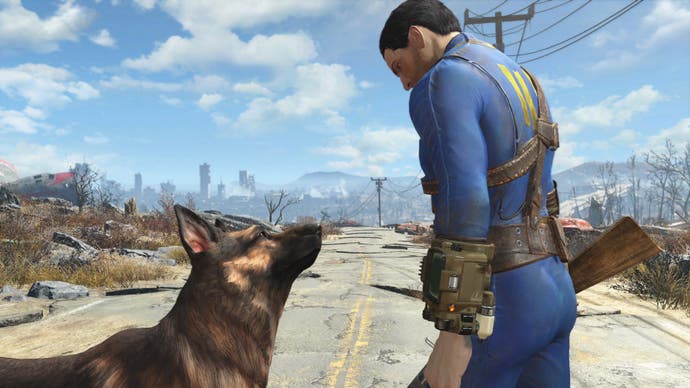The best Fallout games to play right now
Score never changes.
What is the best Fallout game? Choosing the best Fallout games to play can be a tricky business, especially if you've been bingeing the Fallout TV show but have never set foot in any of the series' virtual wastelands. Fallout games are generally demanding of your time, and although they share similar themes and mechanics, they differ in small but significant ways that can mean you might love one while bouncing off another.
When it comes to picking the best Fallout game for you, there's good news and bad news. The good news is that there are no bad Fallout games. Every mainline RPG in the series offers a sprawling adventure filled with weird and exciting tangents, while the various spin-offs explore their chosen genre in interesting ways. The bad news is the depth of each Fallout RPG is inversely proportional to its accessibility. If you want to play Fallout with the least amount of fuss, you may not see the full extent of what the series can do. On the other hand, if you want the richest RPG experience, you'll have to put up with more idiosyncrasies. In short, the best Fallout game may not be the best one to start with, per se.
We've approached this ranking as a best Fallout games of all-time list, so please bear that in mind when reading this list. Without further ado, then, here's our list of the best Fallout games from worst to best.
8. Fallout Shelter
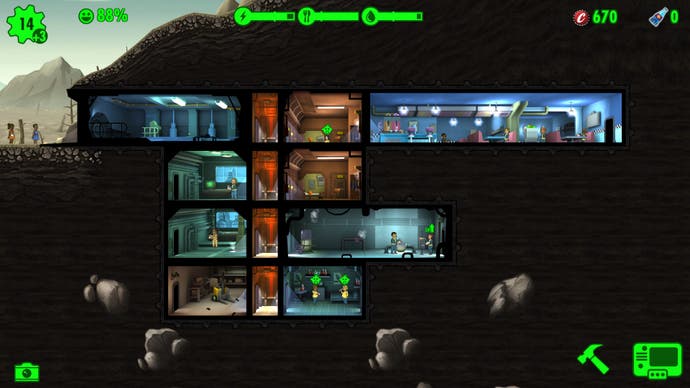
Fallout Shelter isn't so much the worst Fallout game as it is the least essential. A free-to-play colony sim, Fallout Shelter lets you build and manage your very own Vault, placing rooms, assigning dwellers to jobs based on their skillsets, and trying to maximise productivity without setting the entire Vault on fire.
Shelter employs many of the usual free-to-play tactics, such as premium currencies, randomised loot-boxes, and an arguably slower-than-necessary progression. But it's also a neat example of a lighter take on a management-style game. Designing your Vault and optimising its production is genuinely satisfying, and the mechanic of "rushing" jobs to get resources faster adds a more immediate risk/reward element to your broader plans. It's also neat to have a game built entirely around Vault-Tec's cartoonish branding, while you normally only see glimpses of as you explore Fallout's radioactive hellscape. That said, Shelter is neither a great Fallout game nor a great colony sim. If you want to know what Fallout is about, this isn't the game you should play.
7. Fallout Tactics: Brotherhood of Steel
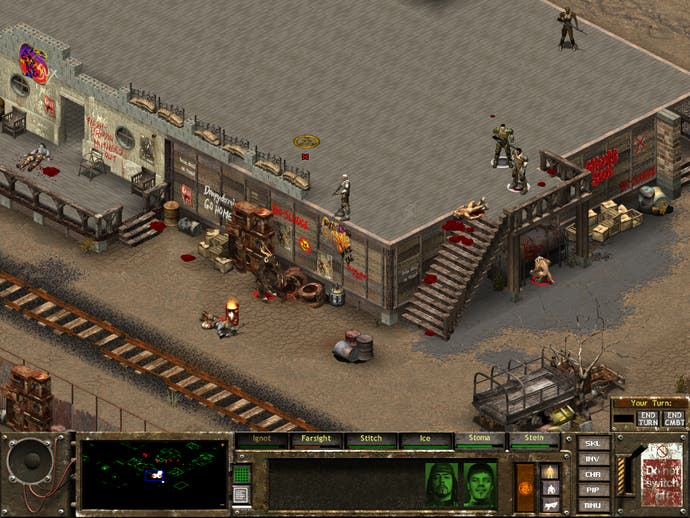
Fallout goes Commando in 2001's tactics-focused spin-off from the early RPGs. Placing you in the role of an Initiate in the Brotherhood of Steel, you're tasked with leading a squad of other recruits on missions to help the Brotherhood stamp its authority amid the ruins of the American Midwest. Too much talk about Tactics revolves around whether or not its lore is canon, rather than the fact it provides an interesting change of emphasis from the rest of the series. If you've ever felt like later Fallouts made the combat too simplistic, Tactics is all about the granular details of planning and executing combat manoeuvres.
Playable either in turns or real-time, the game lets you take direct control of each member of your squad, allowing you to change their stances, sneak around maps, and set them up in "sentry" modes similar to X-COM's overwatch. Like Shelter, Tactics does encounter the problem that there are a lot of newer games around that explore these ideas better, from Firaxis' X-COM series to Shadow Tactics and last year's Shadow Gambit. But Tactics is a better Fallout game than Shelter, offering a decent story to along with its more combat-focused play. It definitely isn't the first Fallout game you should play. But for existing fans, it's worth checking out.
6. Fallout 76
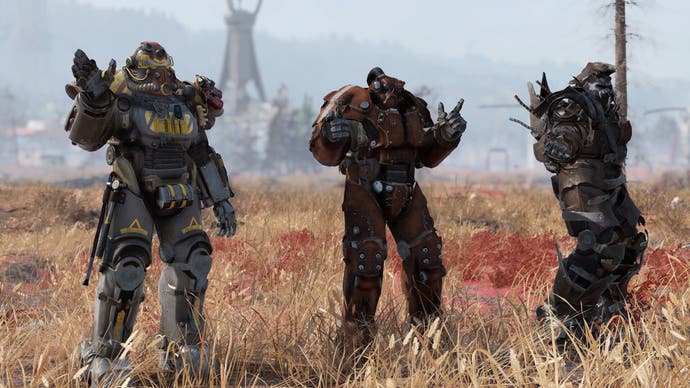
There was a time when Fallout 76 was unambiguously the worst Fallout game. Bethesda's Fallout MMO infamously launched as an empty shell, lacking NPCs, devoid of a meaningful story, and filled with samey fetch-quests and boring, grindy combat. In the years since, Bethesda has improved the game substantially. Those missing NPCs have been added in, but the main quest has also been completely reworked, featuring a proper branching narrative that involves different factions within the Wasteland. It also lets players get ahead on some of that grind, with the option to start the game at level 20. This not only provides a more immediately satisfying combat experience, it also lets you specialise your character in one of five different presets, each coming with unique perks and gear.
In sum, it's a much better game than it was. But its experience still lags behind the mainline series. While the main story is improved, it's considerably shorter than what you get in the single-player Fallouts. It also places an even greater emphasis on base-building than that seen in Fallout 4. Though this makes better sense in 76's primordial wasteland, it's still quite a fundamental misunderstanding of what people want from a multiplayer Fallout. Still, if you want to explore the wasteland with friends, or have exhausted the single-player games, Fallout 76 now sufficiently lives up to its promise to make it worth investigating.
5. Fallout 4
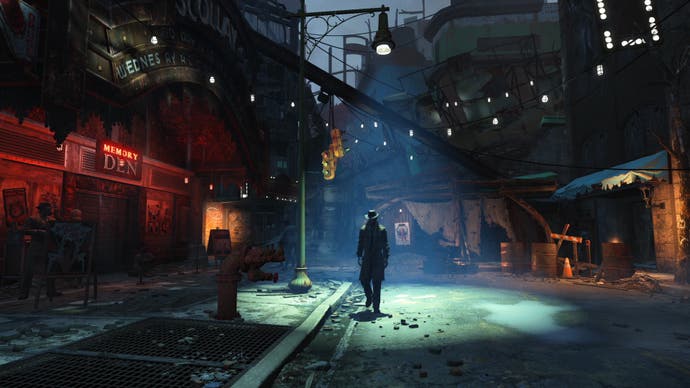
It's important to remember my point about there being no bad Fallout games here. Fallout 4 has a lot going for it. It's the best-looking of the mainline RPGs - especially with the recent "next-gen" update. It's the most streamlined game in the series. It has the best set of companions of the 3D games, including all-timer legend and synth detective Nick Valentine. It also has multiple excellent side-quests, including one where you have to repair a nuclear submarine for a pretty astonishing reward, and another that involves helping a bunch of robots rebuild a rocket-powered 18th century naval frigate.
But the reason Fallout 4 sits at the lower end of this list is twofold. First, the settlement-building system is, at best, an acquired taste. The system feels bolted on to a game that isn't really designed to support it, and spiritually it's at odds with Bethesda's emphasis on building worlds designed to be explored. The bigger problem, though, is that Fallout 4 is a pretty weak RPG. It's closer to a modern Far Cry game than the original Fallout, with an overwhelming emphasis on combat at the cost of narrative choices and character building. The switch from a list of dialogue options to a dialogue wheel limits the personalities your character can inhabit, while your ability to choose your stats is significantly watered down compared to previous games. That said, these design choices also make Fallout 4 the easiest of the mainline RPGs to get into, so while it doesn't embody the series' full range, it is an ideal place to start your adventure in the wasteland.
4. Fallout 3
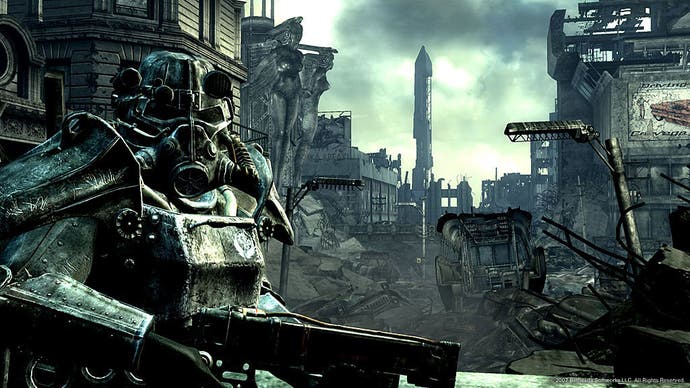
Bethesda's first attempt at translating Fallout to a first-person, open-world format remains the studio's best, making the wasteland more tangible and accessible without completely losing sight of the series' RPG roots. It may be harder on the eyes than Fallout 4, but the game offers superior options for building a character around stealth, while the dialogue choices facilitate a wider range of personalities than Fallout 4, letting you fully embrace your identity as a saintly hero or a total bastard.
Fallout 3 combines with a slightly stronger main story and a similarly eclectic range of side-quests, letting you mediate in a battle between two warring superheroes, and choose whether or not to blow up an entire town. Fallout 3 does a particularly good job of building upon the lore of the Vaults as revealed in Fallout 2, with the various shelters scattered around the Capital Wasteland providing some of the game's weirdest, funniest and darkest moments. It should also be noted that Fallout 3 has a particularly strong line of DLC, including the wretched hive of scum and villainy that is the Pitt, a blast from Fallout's pre-war past in Operation Anchorage, and the opportunity to fight alongside the Brotherhood in Broken Steel, the latter altering how the vanilla game ends.
3. Fallout 2
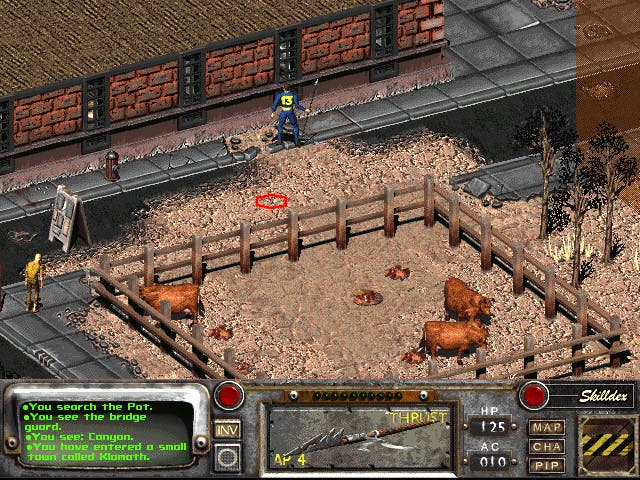
A classic example of sequel-making, Fallout 2 takes all the elements that made the original great, polishes up the first game's rougher edges, and massively blows the scale. Its main selling point is how it indulges in the ideas established in the original, giving you a bigger, weirder, wilder Wasteland to explore. The sequel introduces several key new factions including the New California Republic, while the story includes some of the most crucial turns for the series' overarching narrative.
That said, there are a couple of reasons why it ranks lower on this list than the original. While it's a bigger game, it's also baggier and less consistent. It's slower to get going than Fallout 1, starting off with the rather punishing gauntlet that is the temple of trials. The writing can be more hit and miss too, though it remains generally a very smart, funny game. More importantly, Fallout 2 is very much a continuation of the story and ideas established in Fallout 1, with you playing a direct descendent of the original Vault Dweller. Because of this, there isn't much point in playing it without experiencing the original game first. It's about giving you more of that experience, rather than an alternative.
2. Fallout: New Vegas
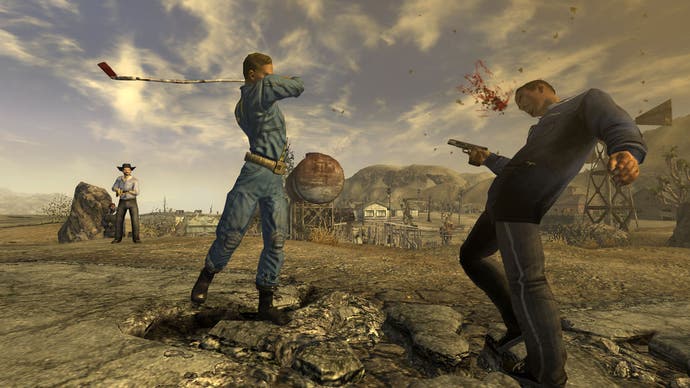
Comfortably the best 3D Fallout, New Vegas takes the fundamentals of Fallout 3, and enhances the role-playing elements Bethesda diluted during the series' transition between 2D and 3D. Eschewing the traditional Vault Dweller starting point in favour of a more Western-inspired storyline, New Vegas puts you in the role of a Courier on the trail of the man who shot you in the head and left you for dead at the game's outset.
Chief among New Vegas' changes is how it replaces Fallout 3's binary karma system for a more nuanced reputation mechanic that affects your relationship with different factions in the game. How you deal with these organisations will affect the quests you can embark on, the companions who'll accompany you on your journey, special abilities that you can call on, and even the trajectory of the entire story. New Vegas combines this with a generally richer, more flexible blend of systems and narrative that allows for enhanced role-playing in quests, and a setting more in tune with the weirder fringes of Fallout. Its only real downside is that the apocalypse is less keenly felt in the Mojave, as New Vegas largely avoided the bombs. In every other way, however, this is as good as 3D Fallout gets.
1. Fallout
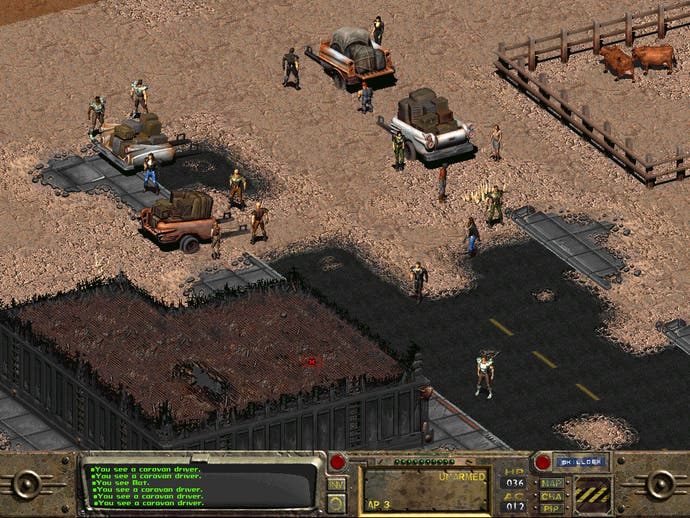
Fallout's isometric perspective, clunky menus can make it intimidating to return to today, but everything the series has ever done well can be found right here. The blend of nuclear horror and kitsch retrofuturism. The morally grey branching narrative. The weird quests and encounters. Even specific details, such as perks like Bloody Mess and Mysterious Stranger, are there from the start.
Interplay's original also does some things better than any game that followed it, such as communicating the inescapable horror of the end of the world. There is an eerie, haunting quality to its atmosphere that all the green haze and environmental storytelling skeletons of Bethesda's games never quite managed to recapture. It's a frequently weird, absurd, and funny game, too. But beneath all that is a lingering dread that pursues you through your entire adventure. Beyond that, the original Fallout remains a remarkably flexible game, built with pathways and solutions for every conceivable build and decision in mind. It's a shorter game than the other Fallouts, but this also makes it easier to discover how your choices affect your experience.
Yes, it's combat is scruffy by today's standards. Yes, the timer attached to its main quest can be scary for the uninitiated. And yes, you should under no circumstances give Ian an automatic weapon. But ultimately, Fallout is a classic for a reason, and while many other games have attacked its ideas from different angles, none of them have done it better.
